This is the first in a series of blog entries answering questions that I receive on wushuzilla.com, as well as other website sources. If you would like to submit a question, please visit my contact form here.
“… may I request your help in creating a training plan? I would like to know more about the PT that the Chinese professional teams do, and if possible, the schedules of the different teams you have trained with so far. Right now, I train 6 times a week, with 3 times spent in the gym and the other 3 in Wushu. During Wushu I do Jibengong for all sessions, spend one session refining my taolu, one session working on Nanquan/Nandao/Nangun basics, and one session on stances. I’d like to know your opinion of my current training plan and how I can change it. …”
Well, i’m a little hesitant to recommend a specific course of training without knowing more about your situation or being your coach. I always recommend that people work with their coach to develop a plan of action, since they are the ones that are most familiar with your specific needs/limitations/advantages/skills. Otherwise I might recommend something for you that is inappropriate.
Regarding Power Training (力练), there are also a LOT of variation on what coaches do. But there are some similarities too. The most important thing is that you are supervised by someone who knows what exercises to do for wushu athletes. Building strength in the typical western gym environment way is not going to help your wushu. The wushu athletes’ exercises are very, very specific to the sport they are training in. I’ve posted some videos of their exercises here, but again, you should have someone who knows what they are doing walk you through the steps. (Unfortunately a lot of the people who know what they are doing are here in China, not at your local 24 Hour Fitness.)
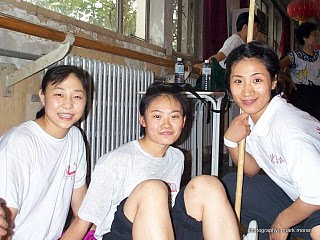 Beijing Team Athletes training, May 1999
Beijing Team Athletes training, May 1999
For the schedules of the various teams I’ve trained with, I have to say that it really varies depending on the time of year and their competition schedule. Also on which athletes are on the roster and which aren’t. Plus, each team and coach has a different approach to training so that adds to the variety as well. For the most part a
verygeneric training plan for a professional team is something like this:
*Training on Monday to Saturday. Sunday off.
*Morning training is taolu-focused. (typically 9 – 11 am)
*More than 2 months before competition = more nandu and small combinations
*Less than 2 months before competition = more taolu and sections (分段)
*Afternoon training (typically 3- 5 pm)
*2 Times a week is power training / conditioning focused
*2 Times a week is running, one is wind sprints and one is long distance
Occasionally coaches will also have them do some early morning training for an hour (6 – 7 am) before breakfast — usually conditioning or basics — and/or evening training from 7 – 9 pm. That is not as common though.
Like I said, that is a VERY generic plan that most professional teams follow. There are ALWAYS variations and differences in the approach so it not meant to provide any sort of training guideline for you or anyone else out there. Again, talk with your coach about the best training plan for you.
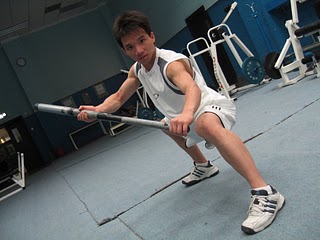 Li Neng Miao says: More nanquan basics!
Li Neng Miao says: More nanquan basics!
Regarding your current training regimen, I have to say that it really depends on what you are training for, what your goals in wushu are, and where you are on your competition schedule (even assuming you want to compete).
One thing I can suggest (keeping in mind the caveat that I am NOT your coach and have no jurisdiction over your training, nor should you pay attention to a word I say) is that you incorporate more southern basics in to your daily jibengong (基本功) training. I’ve found this beneficial for my own training, and I notice that most southern style athletes in China do southern basics during every training session, usually substituting a northern combination that they do not do in their forms for a southern one that is more applicable to their style.
For example, for my own training, I will usually replace the following northern combinations/basics that I don’t use for a southern counterpart (please note that I am not sure of my Chinese terminology with southern basics as of yet, so some of the pinyin might be off):
*Back Sweep = Gua Gai (over-strike with fist)
*Front Sweep = Qi Ling Bu (3-step stances with palm combination)
*Double Body Turn = swinging fist thingee (ala end of 2nd section in compulsory nanquan)
*Heel Kick Push Palm = Double outer swinging arm block with heel kick
etc. etc. .. You get the idea. It is
very
important that you let your coach know what you plan to do. Don’t just start sticking nanquan basics in there, and when they ask you what you’re doing say “Mark from Wushuzilla.com told me to!” because then they won’t be the only ones smacking you up-side your head.

But aside from that small suggestion of incorporating more southern basics in to your regular training routine, I really think your coach is the best person to provide you with guidance. They know you better than I do (and possibly even better than you do) so always defer to their wisdom and experience (which they hopefully have in abundance).
And I will repeat that the way you train depends mostly on your goals with wushu. If you are training for exercise and fun then you would do a different type of training than if you were training for a competition, or if you were training to get on the U.S. team, or if you were training for the 4th World Traditional Games next year. Each has a different set of training guidelines that would go with them.
As an example, my type of training right now is suited for someone who might compete 5 or 10 months down the line in a non-nandu division southern event. If I was going to try out for the U.S. Team, then my particular training would not be appropriate.
Thanks for the question!
“… However I’ve been facing a persistent issue with self-taught Southern style. My coach [has] infused some of her Northern Wushu characteristics into her Southern stuff; on certain occasions she handles the Nandao like a broadsword.
I’ve been watching countless videos and picking the best ones to learn from, and [my coaches] have an issue with my “independence”. I know it’s a matter of respect to follow your coach, but I feel that something is up when [everyone else] is doing something else at Nationals and yet my coach and his coach want me to do her style of Nanquan, which has vast differences from the Guangdong style [which I take as] the originating style and hence the final word on everything Southern.
Right now, I’ve decided to follow my instincts and continue learning from He Qiang’s videos, but I can’t help but feel a bit guilty at my defiance. Am I being too independent and confident in my decision to follow videos? I’m really interested in what you think about this… ” (edited from the original)
This is something I can relate to, as I had to deal with this for many years too.
In fact, my own original coach is not a southern specialist either. Granted Hao Zhi Hua is arguably the top female wushu competitor of her generation and has a skill and ability that I would probably never achieve in two lifetimes, but even the most accomplished professional athlete has their strengths and weaknesses. For myself, it is difficult to talk about my coach in negative terms when I actually have a huge amount of respect for who she is, what she has done and what she knows.
However, this doesn’t mean we should all turn a blind eye to these issues when they exist. There are ways to overcome and work around them, but part of it depends on your specific situation.
This is actually a pretty common problem among southern stylists. You and I aren’t the first people to deal with a northern-style coach teaching improper southern technique. (Again, I want to take nothing away from what they ARE amazing at, because most coaches are deserving of a lot of respect.) In fact, at almost every school I’ve been to there have been issues with this, because for the most part the majority of coaches are northern stylists. Especially in the U.S. there just aren’t a ton of good wushu coaches who are experienced with competing and training in nanquan — I can probably count them with the fingers from one hand (and if you have one, count your blessings!).
So, how to deal with this issue? Well, first I’ll tell you how I handled it, and then I will make some suggestions on ways that you might approach the situation (again, not really knowing too many specifics about who you are or your environment).
When I first started learning southern I actually discovered rather quickly that some of the technique I was being taught was actually not southern at all. Again, I had the benefit of being able to watch a video or two of good southern people from China and I realized there was a discrepancy between what I was doing and what they were doing, and not just related to skill level.
Early on in my wushu life I got some advice from David Chang, who had been training at multiple schools for a while. He also said that, even with northern styles, sometimes one coach wants you to do it a certain way, and another coach wants you to do it a different way. When I asked him what he did he said that he did it the way that was appropriate for the coach he was training with.
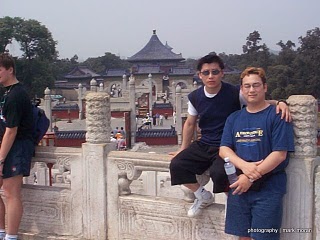 With my first Nanquan Coach, He Jing De, Temple of Heaven, Beijing, 1999
With my first Nanquan Coach, He Jing De, Temple of Heaven, Beijing, 1999
He admitted that it was more difficult that way, but he also said that at least it gave him options that having just one coach might not, and that, in the end, when he competed he did so in the way that he felt worked best for his particular style. On his own he would train for himself, but when in class he would train for his coach, even thought the two might conflict.
It might seem a little duplicitous to put on a “front” for your coach, while at the same time you are actually working on a different way of doing it for yourself. And it might seem like a lot of extra work to keep that up. But since we are dealing with coaches, egos, face and guanxi, you have to keep in mind that sometimes the best way is not necessarily the best way for YOU.
For myself, a few years (4 years, 2 months, 12 days, to be precise) after I started wushu, I was able to travel to Beijing and learned some nanquan from Jian Zeng Jiao (who was at that time a southern specialist) and He Jing De. When I returned to Wushu West it allowed me to gain some southern independence because now I was training with a form that was taught by a southern specialist and it was also a form and some techniques which my coach was not familiar with.
Two years later I moved to L.A. and that actually proved advantageous because I was an “outsider” at the schools I came to. Meaning, the coaches there didn’t have any “ownership” of my development and allowed me to work on that which I needed to work on. At the same time, since most of the coaches weren’t as familiar with nanquan, they allowed me a bit of elbow room with regards to technique and training.
Then, a year after I moved to L.A. I started training with He Jing De and then it was all gravy. Obviously he knows nanquan pretty well and training with him really helped my understanding and development of nanquan to a different level. To this day when someone asks me who my coach is, I first tell them that I am a student of Hao Zhi Hua, but that I learned nanquan from He Jing De (and Xie Fu Yan, but that comes later).
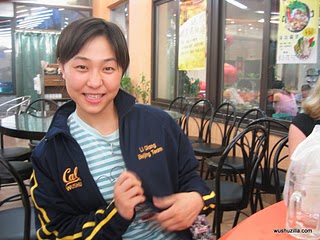 My Shi Cha Hai NQ Coach, Li Qiang (Beijing, 2005)
My Shi Cha Hai NQ Coach, Li Qiang (Beijing, 2005)
So, for me, the way I was able to work around my situation was in finding other sources of nanquan education to help my development. I was also lucky because I had a coach that was able to recognize that there were some things she might not know as well as others and she wasn’t so pride-filled as to not allow me to develop skills with other coaches. In fact, in certain situations she encouraged it. For example, whenever the Beijing Wushu Team would visit and have a seminar, she would make sure that me and the other nanquan athletes at Wushu West would be paired up with a good nanquan athlete to help us with our technique.
If you are lucky, you have a coach that can acknowledge their deficiencies and allow you to explore your own artistry and technique, or provide you with opportunities to learn what they might not be able to teach. But often that isn’t the case. Chinese culture has a lot of absolutely wonderful aspects to it, but one of the tricky things for people to deal with is the issue of pride and face. If your coach is dealing with these issues, then it is important that you provide them an opportunity to feel acknowledged in what they contribute to your training, but at the same time you also keep in mind that your training is not just for them — it is primarily for you and your development as an athlete.
This isn’t carte blanc to be selfish with your training, but it is a good distinction to make so that you aren’t sacrificing your own development for the sake of someone else’s pride or ego.
So, what are the solutions for your particular situation?
Well, first, I think that communication is often the best solution to a problem. Talk with your coach and see if they are able to recognize your situation. If you approach them with some humility, respect and a strong desire to seek out their advice, then they might be able to put aside their attachments or pride and help you identify solutions to what is going on. I know that a lot of people are scared to approach or talk with their coaches about the issues they have with training, but you might be surprised at how understanding they can be. After all, they were all athletes once themselves.
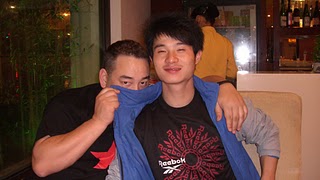 With a sleepy Xie Fu Yan (Shanghai, 2007)
With a sleepy Xie Fu Yan (Shanghai, 2007)
Second, you can do as David did, and train for yourself on your own and train for your coach in class. This is really only a resort if you don’t want to make waves and/or you don’t think your coach can’t handle it if you approach them about your situation. Whereas David’s situation had him swapping technique between different coaches/schools, you can consider yourself swapping between your own coach and “Sifu Video”, if you will. We all should be training, at least mentally, on our own, and during that time you can focus on the technique that you want to develop for yourself and your competitions.
Third, as I mentioned with my own experience, one thing you can do is travel or train with other coaches in an environment that is supported by your own coach. For example, if you can, travel to Shanxi where your coach is from, and while there get paired up with a southern specialist and learn the heck out of them. Then, when you come back, there will be that distinction that you have “specialized” and “studied abroad” in your style and that will bring with it the impression that your skill set is distinct and different than someone who only trained at your school. It is sort of a psychological “ploy”, if you will, but it does work.
And finally, (and this is something I would recommend as a last resort ), if you really feel that your coach and you are at an impasse, then it might be time to explore other options. However, having said this I don’t really recommend it. It is never a good idea to burn bridges with your coach because it can come back to haunt you in the future. If you DO end up going to another school because of relocation or you move aborad, etc., then be sure to keep a good relationship with your coach and keep in touch with them. Often times the occasional phone call from a former student really makes a coach’s day. (That reminds me that I need to call my coach and say hello …)
I”m sure there are a lot of other options available to you, but without knowing you and your situation it is hard to make more specific suggestions. Again, I always advise that it is best to communicate openly and honestly with your coach and talk it through with them. The other “options” are there only for perspective. They might not apply to you.
Thanks for your question!
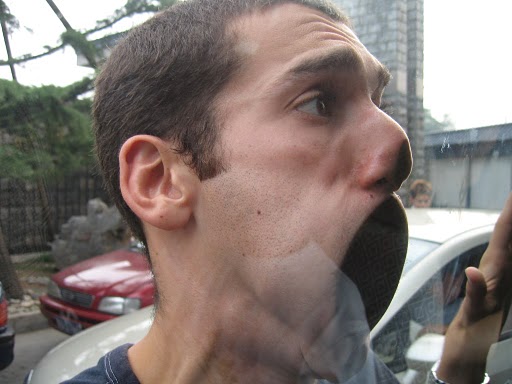 Unrelated Bonus Picture of Shahaub (Beijing, 2006)
Unrelated Bonus Picture of Shahaub (Beijing, 2006)
Get more information at narom.net and wushuzilla.com